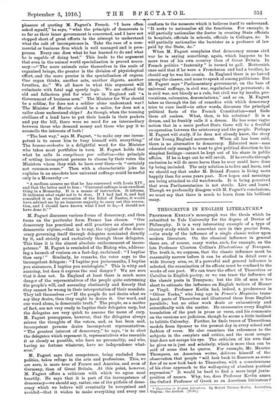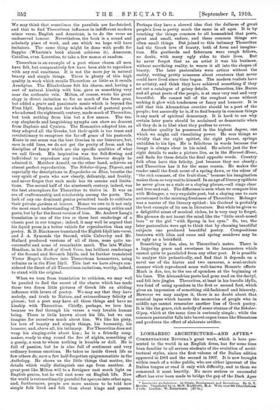TEMOCRITUS IN ENGLISH LITERATURE.*
PROFESSOR KERLIN'S monograph was the thesis which he submitted to Yale University for the degree of Doctor of Philosophy. It is a very interesting example of a type of literary study which is somewhat rare in this precise form, —the study of the influence of a single classic writer upon modern literature. On the classical influence in general there are, of course, many works, such, for example, as the late Professor Churton Collins's Illustrations of Tennyson. The truth is, we suppose, that the classic influence must be reasonably narrow before it can be studied in detail over a wide literary area, or, if a powerful and general influence is selected, the examination of its effects must be confined to the works of one poet. We can trace the effect of Theocritus or Catullus in English poetry, or we can trace the influence of the classic poets in Tennyson; but the life of man is too short to estimate the influence on English writers of Homer or Virgil. Professor Kerlin had, indeed, a predecessor in "Oliver Yorke," who long ago in Fraser's Magazine trans- lated parts of Theocritus and illustrated them from English parallels ; but no other work deals so exhaustively and scientifically with the matter. He enumerates every English translation of the poet in prose or verse, and his comments on the versions are judicious, though he seems a little inclined to belittle Calverley. Further, he finds traces of Theocritean models from Spenser to the present day in every school and fashion of verse. He also examines the references to the subjects in the essayists and critics, and the most meagre hint does not escape his eye. The criticism of his own that he gives us is just and scholarly, which is more than can be said of some that he quotes. For example, Mr. Maurice Thompson, an American writer, delivers himself of the observation that people "will look back to Emerson as some few of us now look back to Theocritus, with a consciousness of his close approach to the well-spring of absolute poetical expression." It would be hard to find a more inept juxta- position of names. Why, too, does Professor Kerlin annex the Oxford Professor of Greek as an American litterateur.?
• Theocritus in English Literaturs. By Robert Thomis Kerlin. Lexington, Virginia: the Author. DUO.]
We may think that sometimes the parallels are far-fetched, and that to find Theocritean influence in indifferent modern minor- verse, English and American, is to do the verse an undeserved honour. Nevertheless, the book is a sound and scholarly piece of work, and one which we hope will have imitators. The same thing might be done with profit for Sappho (Wharton's book almost achieves it), Anacreon, Catullus, even Lucretius, to take a few names at random.
Theocritus is an example of a poet whose charm all men have felt, but comparatively few have been able to reproduce with any real exactness. It is not the mere joy in natural beauty and simple things. There is plenty of this high quality in work which recalls Theocritus as little as it recalls Aeschylus. The Elizabethans felt his charm, and, having a sort of natural kinship with him, gave us something very near the authentic vein. Milton, of course, wrote his great elegy in direct imitation so far as much of the form goes, but added a grave and passionate music which is beyond the First Idyll. Dryden, and the whole school of pastoral poets who adorned the eighteenth century, made much of Theocritus, but took nothing from him but a few names. The tea- cup shepherds and languishing nymphs can show no descent from Daphnis and Cynisca. The Romantics adopted him, as they adopted all the Greeks, but their spirit is too tense and revolutionary to recapture the far-off grace of his pastorals. Keats in one sense was the best Grecian in our literature, but, save in odd lines, we do not get the purity of form and the discipline of fancy which are the specific qualities of what we call Greek. His inspiration was too full-flowing and individual to reproduce any tradition, however deeply he admired it. Matthew Arnold, on the other hand, achieves an almost perfect reproduction. The Scholar-Gipsy, Thyrsis, and especially the descriptions in Erapedoeles on Etna, breathe the very spirit of poets who saw clearly, delicately, and freshly, and never forgot that each mode has its canons and limita- tions. The second half of the nineteenth century, indeed, was the best atmosphere for Theocritus to thrive in. It was an era of craftsmanship and scholarship among the poeta. The lack of any one dominant genius_ permitted bards to cultivate their private gardens at leisure. Hence we owe to it not only the Most exact understanding of Theocritus among critics and poets, but by far the finest version of him. Mr. Andrew Lang's translation is one of the two or three best renderings of a classic poet in our tongue ; indeed, it may well be argued that his liquid prose js a better vehicle for reproduction than any poetry. R. D. Blackmore translated the Eighth Idyll into verse, and J. A. Symonds the Second, while Calverley and Mr. Mallard produced versions of all of them, none quite un- successful and some of remarkable merit. The late Walter Heacllam, in his Book of Greek Verse, has brilliant renderings of the Second and Seventh Idylls, and he further translated Victor Hugo's Guitare into Theocritean hexameters, using refrains as in the First Idyll. This last we have always con- sidered the finest of all Theocritean imitations, worthy, indeed, to stand with the original.
When we turn from translation to criticism, we may well be puzzled to find the secret of the charm which has made these two dozen little pictures of Greek life an abiding influence with lovers of poetry. We may say that they have melody, and truth to Nature, and extraordinary felicity of phrase ; but a poet may have all these things and have no kinship with Theocritus. Chiefly, perhaps, we love him because we feel through his verses a very lovable human being. There is little known about his life, but we can imagine for ourselves much about him. We like his piety, his lore of beauty and simple things, his humanity, his humour, and, above all, his intimacy. For Theocritus does not wrap his singing-robe about him ; he is a friendly song- maker, ready to sing round the fire of nights, something of a gossip, a man to whom nothing is humble or dull. He is full of passion, but be is also full of sentiment and very ordinary human emotions. • He takes us inside Greek life as few others do, save a few half-forgotten epigrammatists in the Anthology. He shows us the little things that matter, the details which really distinguish one age from another. A great poet like Milton will to a foreigner cast much light on English genius, but he will cast none on English life. Now the world is extraordinarily grateful for aperrus into other ages, and, furthermore, people are more anxious to be told how simple folk lived and felt than about kings and queens. Perhaps they have a shrewd idea that the dullness of great people's lives is pretty much the same in all ages. It is by touching the things common to all humankind that poets, great and small, endure, and these common things are often small things. But joined to this intimacy Theocritus had the Greek love of beauty, both of form and imagina- tion. His goatherds and fishermen were rough fellows,. no doubt, with many ugly sides to their lives. But he never forgot that as an artist it was his business,. without sacrificing reality, to weave it all into the shapes of beauty. The later pastoralists were artists without the reality, writing pretty nonsense about creatures that never could have lived since time began. The modern realists have no artistry, and think they have achieved something if they set out a catalogue of grimy details. Theocritus, like Burns. and all great poets of the people, is at once very real and very beautiful. He cannot tell of the roughest scene without making it glow with tenderness or fancy and humour. It in odd that this Alexandrian courtier should be a poet of the people; but assuredly he is, if to find beauty in common things is any mark of spiritual democracy. It is hard to see why certain later poets should be acclaimed as democratic when. all they do is to libel what they profess to revere.
Another quality he possessed in the highest degree, one which we might call visualising power. He sees things so vividly that the right epithet, the right phrase, springs unbidden to his lips. He is felicitous in words because the image is always clear in his mind. He selects just the few right details to make a picture live, as in the Harvest-Home, and finds for these details the final apposite words. Country folk often have this felicity, just because they see clearly ; and Theocritus has it for the same reason. He makes the reader smell the fresh scent of a spring dawn, or the odour of "the rich summer, of the fruit-time," because his imagination makes them so very real to himself. In an age of literary epithets he never gives us a stale or a cloying phrase,—all rings clear and true and real. The difference is seen when we compare him with Meleager, a very exquisite poet, but a cloying one to ears accustomed to the morning freshness of Theocritus. Meleager was a master of the literary epithet : his Garland is probably the best example of its use in literature. But while be gives us a delightful sense of musical riches, he is very easy to forget. His phrases do not haunt the mind like the "little snub-nosed bees" or the girl "with Spring in her eyes." So, too, the later pastoralists were apt to think that by choosing beautiful subjects one produced beautiful poetry. Compositions bestrewn with lilies and roses and spring meadows may be as ugly as a brickfield.
Something is due, also, to Theocritus's metre. There is a lingering grace and sweetness in the hexameters which cannot quite be paralleled from any other poet. It is possible to analyse this pedantically, and find that it depends on a novel use of the hiatus and two caesuras, a semi-archaic manner which reproduced some well-known Homeric effects Much is due, too, to the use of spondees at the beginning oi his lines. The Alexandrian poets had gone mad on the da,ctyi, and fell into jingles. Theocritus, at least in his bucolic idylls, was fond of using spondees in the first or second foot, which gives an impression of something old-fashioned and leisurely. However we may analyse it, there is no doubt about that musical lapse which haunts the memories of people who in middle age cannot remember another line of Greek poetry. It is like the grave, rich melody of some stanzas of the Scholar- Gipsy, which at the same time is curiously simple ; while the common pastoralist falls into barrel-organ tunes like Shenstone and produces the effect of elaborate artifice.











































 Previous page
Previous page